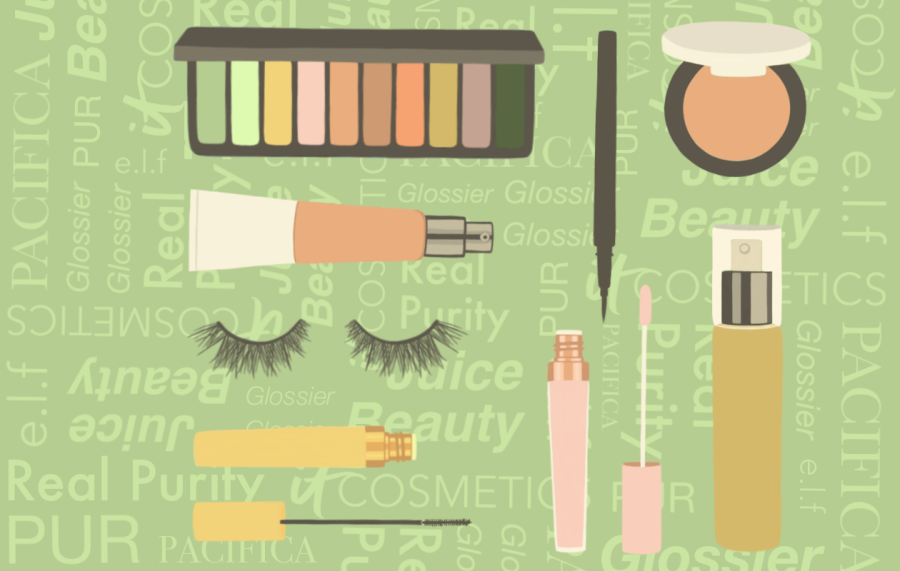A crash course in ethical beauty
October 16, 2019
We live in an age of beauty. Our lives are saturated with shiny products, and we experience a high of sorts every time we walk into a Sephora. However, we also live in a time when many of us consider the impact that the products we use have on ourselves and the environment.
Our beauty regimen is no exception; however, as college kids, funds can be sparse. While we would love to open up our makeup bags to a collection of clean products, opening up our wallets is a different story.
Talk about a dilemma.
Here at A, we decided to delve into the world of ethical beauty to determine if it’s one we can live in while in college. We asked all the questions from what constitutes as “ethical” to who makes the good stuff.
What is ethical beauty?
When we say “ethical beauty,” we mean makeup and skincare that is produced under ethical conditions.
Just like other industries, the truth about production methods, ingredients and dulls the luster. Products aren’t as pretty as they appear. Enter ethical beauty.
What started as a niche group has become a booming business sector; the number of eco-labels on products has grown from a few dozen in the 1990s to more than 400 today. Brands are evaluated through third parties like the Environmental Working Group nonprofit or SkinDeep.
There are multiple standards products strive to meet in order to earn a stamp of approval: Cruelty-free, organic/natural, vegan, plant-based, palm oil-free, fair-trade, eco-friendly packaging…the list is almost overwhelming.
Some labels, such as plant-based and palm-oil free, speak for themselves. Others can be confusing.
“Many brands now are coming out with ‘ethical products,’ and they are marketing their products as cruelty free, which is confusing to the consumer,” said Rachel Jurus, president of Kent State Makeup Artists. “Cruelty free is when a product is not tested on animals, and vegan means that it does not contain animal bi-product. Many consumers do not know the difference between cruelty free, ethically made and vegan products.”
Other labels like all-natural mean ingredients were derived from nature and not chemicals. Organic means no pesticides were used, and fair trade products were made by workers who were paid a fair, livable wage.
While some products meet more ethical product standards than others, consumer discretion weighs their individual value against one another as well.
For example, some find they may use a product that does not test on animals but isn’t vegan, others require a product to subscribe to both. The miracle product that checks all the boxes doesn’t exist yet, but many companies are trying to do their part.
Why are conscious beauty products so expensive?
Just like most markets, you get what you pay for when it comes to beauty.
The cost of natural or organic ingredients are intrinsically more expensive than cheap synthetics. Organic ingredients are one point five to two times more expensive than traditional ones, according to Sarah Villafranco, of Osmia Organics. Not to mention, they’re difficult to source. However, the time needed to locate quality ingredients and fair trade labor is an asset many ethical beauty brands treasure to their core.
Other costs include conscious packaging.
Packaging may be the industry’s largest fault, and trickiest to navigate as a consumer. Many products are packaged using excessive amounts of plastic, which is the environmental enemy. Plastics pile in landfills, emit greenhouse gases and disrupt ecosystems.
Some brands go their own way.
The haircare and skincare label Captain Blankenship uses ocean-recycled plastic to package their goodies. It’s more expensive than virgin plastic, but worth it to founder Jana Blankenship and the brand’s customer base.
How important is it to make the switch?
While it’s an overwhelming shift, it seems wise to move in that direction.
The truth is, changing our lives in small doses is the best way to move forward holistically. Gradually shifting from drugstore products filled with harmful ingredients to more conscious ones is a nod to the environment, as to say I got you.
Many agree with this mantra. Sophomore fashion merchandising major Zeina Katabi said, “Clean and ethical skincare and makeup is more expensive, but the quality and the environmental impact is worth it to me.”
She is not alone. When looking forward, Jurus added, “The beauty industry of the future is growing. Every day new brands are coming out, current brands are releasing new lines/products and stores are updating to carry more products. I am excited to see what the beauty industry will be like in the upcoming years.”
That being said, no need to drop everything to buy a new beauty bag, a steady turnover is a gentle start.
Contact her at [email protected].

























